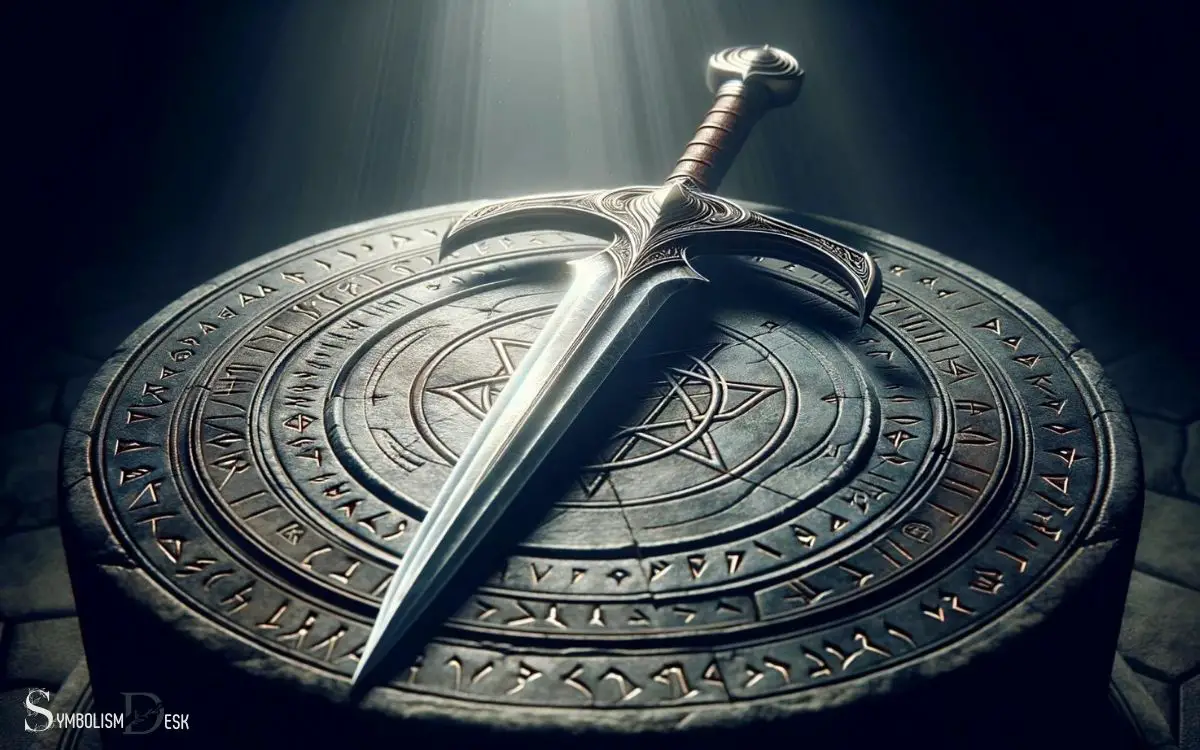What Is the Symbolic Meaning of a Sword? Aggression!
The sword symbolizes authority, protection, and justice across various cultures and historical contexts. It often represents the dual nature of protection and aggression, embodying the struggle between good and evil.
The symbolic meaning of a sword extends beyond its use as a weapon. It encompasses:
- Authority and Nobility: As a symbol of power, it’s often associated with royalty and knights.
- Protection and Defense: Historically used to guard against threats, symbolizing safety.
- Justice and Righteousness: The sword of Lady Justice indicates the fair and equal application of the law.
- Spiritual or Moral Struggle: In religions and myths, swords can signify the battle between good and evil.
Embodied in steel, the sword’s symbolism cuts through time, signifying enduring themes of honor and valor.

Key Takeaway
Unveiling the Symbolic Meanings of Swords Across Cultures
| Culture/Context | Symbolic Meaning of a Sword |
|---|---|
| General | Power, protection, authority, strength, courage |
| Christianity | Truth, justice, the word of God, spiritual warfare |
| Eastern Traditions | Wisdom, discernment, eradication of ignorance |
| Knighthood and Chivalry | Honor, loyalty, bravery, chivalry |
| Samurai Tradition | Honor, self-discipline, loyalty, moral integrity, soul of the warrior |
| Tarot Cards | Action, power, conflict, ambition (in the suit of swords) |
| Freemasonry | Truth, obedience, sacrifice |
| Alchemy | Purification, transformation |
| Celtic Mythology | Supernatural power, freewill, the attribute of the hero |
| Fantasy Literature | Magic, heroism, adventure |
Historical Significance of Swords
While the symbolic meaning of a sword holds great significance in various cultures, its historical importance can be traced back to ancient times.
The sword, as a weapon, played a pivotal role in shaping the course of history. It symbolized power, authority, and honor across civilizations, from the Roman gladius to the Japanese katana.
Swords weren’t only tools of warfare but also status symbols for the elite. They were often adorned with intricate designs, reflecting the wealth and prestige of their owners.
The evolution of sword-making techniques further illustrates the significance of these weapons in human history.
Transitioning into the next section, the historical context provides a foundation for understanding the cultural symbolism of swords.
Cultural Symbolism of Swords
The historical significance of swords transitions into the cultural symbolism they embody as symbols of strength, justice, and valor in various societies.
Throughout history, swords have held significant cultural symbolism in different civilizations, representing bravery, honor, and protection.
The following table illustrates the cultural symbolism of swords in various cultures:
| Culture | Symbolism |
|---|---|
| Japanese | Samurai honor and discipline |
| Celtic | Bravery and heroism |
| Norse | Protection and power |
| Chinese | Strength and authority |
| Middle Eastern | Justice and righteousness |
These cultural symbolisms showcase the universal recognition of swords as emblems of noble virtues and ideals, deeply ingrained in the collective consciousness of diverse societies.
Mythological Representations of Swords
Mythological representations of swords offer a rich tapestry of symbolism and significance. In various myths and legends, the sword is often portrayed as a divine weapon, embodying the power and authority of the gods.
Furthermore, the role of swords in heroic tales and the symbolism of swordsmanship add layers of complexity to the mythological significance of these iconic weapons.
Sword as Divine Weapon
Frequently, gods and heroes wield swords as divine weapons in mythological stories, symbolizing power and authority.
In these tales, the sword serves as a tool for enforcing justice and vanquishing evil, embodying the following characteristics:
- Radiant Blade: The divine sword often gleams with an otherworldly light, signifying its supernatural origins and potency.
- Unyielding Strength: It’s depicted as unbreakable and capable of cutting through any obstacle, reflecting the unstoppable force of divine will.
- Guardian of Virtue: The sword is entrusted to the worthy and pure-hearted, emphasizing its role as a protector of righteousness.
- Symbol of Sovereignty: When wielded by a deity or chosen hero, the sword represents their rightful rule and authority over the mortal realm.
These mythological representations cement the sword’s status as a revered symbol of divine power and justice.
Swords in Heroism
In heroism, swords are often depicted as a crucial tool for vanquishing evil and upholding justice, symbolizing the valor and determination of those who wield them.
Mythological representations of swords in heroism abound in various cultures. For instance, in the Arthurian legends, the sword Excalibur represents King Arthur’s divine right to rule and his heroic qualities.
Similarly, in Norse mythology, the sword of the hero Sigurd, Gram, is essential for slaying the dragon Fafnir and achieving glory.
These mythological swords embody not only physical power but also the moral and spiritual strength required for heroic deeds.
The symbolism of swords in heroism serves to inspire individuals to stand up for what’s right and to confront adversity with courage and integrity, reflecting the noble ideals of heroism.
Symbolism of Swordsmanship
Swords, as depicted in heroism, are wielded with great skill and symbolism, embodying the courage and valor of those who wield them in mythological representations.
In various mythological stories, the symbolism of swordsmanship is rich and profound, often representing:
- Mastery and Skill: Swordsmanship symbolizes the mastery of combat and the skill required to wield a sword effectively.
- Justice and Honor: The act of swordsmanship is often associated with upholding justice and honor, as seen in the hands of legendary heroes and noble warriors.
- Conflict and Resolution: Swords represent the conflict and the resolution of challenges, as they’re used to overcome adversaries and restore balance.
- Spiritual Growth: In some myths, the journey of swordsmanship symbolizes the spiritual growth and development of the hero, reflecting inner strength and discipline.
Spiritual and Religious Meaning of Swords
The spiritual and religious significance of swords has been prevalent throughout various cultures and belief systems. In many traditions, the sword is seen as a symbol of protection, truth, and justice.
For example, in Christianity, the sword is often associated with the word of God and spiritual warfare.
In Hinduism, the goddess Durga is depicted wielding a sword to symbolize divine strength and the ability to cut through ignorance.
Similarly, in Japanese Shintoism, the sword is considered a sacred object and a symbol of valor.
The ritualistic and ceremonial use of swords in various religious practices underscores their spiritual importance.
Sword Symbolism in Literature and Art
Literature and art often incorporate the sword’s symbolic significance to convey themes of honor, conflict, and heroism.
In various literary works and artistic representations, the sword serves as a powerful symbol, evoking specific imagery and emotions:
- Chivalry and Honor: Swords are often associated with chivalric codes and the concept of honor, portraying characters who wield them as noble and courageous.
- Conflict and Battle: The presence of swords in literature and art signifies impending conflict or represents the physical manifestation of a character’s inner struggles.
- Heroism and Sacrifice: Swords can symbolize the hero’s journey, depicting acts of bravery, selflessness, and sacrifice in the face of adversity.
- Authority and Justice: In many narratives, the sword represents authority and the execution of justice, often wielded by leaders or figures of power.
Modern Interpretations of Sword Symbolism
In contemporary contexts, swords continue to hold symbolic significance. They are often seen as representing strength, determination, and the struggle for justice.
Modern interpretations view the sword as a powerful symbol of resilience and the ability to overcome adversity. It is associated with courage, honor, and the willingness to fight for what’s right.
Moreover, in popular culture, such as movies and video games, swords are often depicted as tools of heroes and heroines.
They embody their unwavering dedication to achieving their goals. The modern interpretation of sword symbolism also encompasses the idea of self-discipline and the need to make tough decisions in order to achieve success.
Transitioning into the subsequent section, the personal and psychological significance of swords delves into the deeper individual connection to this powerful symbol.
Are Dragons and Swords Often Symbolically Linked as Symbols of Power and Aggression?
For centuries, the symbolic meaning of dragons and swords has been intertwined. Dragons are often seen as powerful and aggressive creatures, while swords symbolize strength and authority. In many cultures, both are linked as symbols of power and aggression, representing the ability to conquer and dominate.
Personal and Psychological Significance of Swords
The personal and psychological significance of swords can be seen in various aspects of human experience.
Symbolism in swordplay, the use of swords as a tool for empowerment, and the psychological impact of swords on individuals are all important to consider.
These points shed light on the deep-rooted connection between people and the symbolic meaning of swords.
Symbolism in Swordplay
Why do swords hold personal and psychological significance for individuals? Swords carry deep symbolic meaning and can evoke powerful emotions due to their historical and cultural significance.
When considering the symbolism in swordplay, it’s essential to understand the personal and psychological impact that these iconic weapons can have:
- Empowerment: The act of wielding a sword can instill a sense of empowerment and confidence in individuals, symbolizing strength and courage.
- Conflict and Resolution: Swords represent the duality of conflict and resolution, embodying the struggle between opposing forces and the quest for harmony.
- Honor and Duty: For many, swords symbolize honor and duty, reflecting a commitment to principles and the defense of beliefs.
- Self-Discovery: Engaging in swordplay can be a journey of self-discovery, representing the quest for personal growth and mastery.
Swords as Empowerment
What personal and psychological impact does wielding a sword have on individuals, symbolizing strength and courage?
The act of holding a sword can evoke a sense of empowerment, as it represents the ability to protect oneself and others.
Psychologically, the sword can serve as a symbol of inner strength and determination, encouraging individuals to face challenges with courage and resilience.
For many, the physical act of wielding a sword can translate into a feeling of personal empowerment, fostering confidence and assertiveness.
In a psychological context, the symbolism of a sword can provide a visual representation of one’s ability to overcome obstacles and adversity. In a psychological context, the symbolism of a sword can provide a visual representation of one’s ability to overcome obstacles and adversity. It embodies qualities like strength, resilience, and the capacity to cut through challenges with precision and determination. Similarly, just as the sword carries personal and transformative significance, the symbolic meaning of the Eiffel Tower often reflects aspirations, endurance, and the pursuit of elevated perspectives, inspiring individuals to rise above difficulties and embrace growth. Together, such symbols encourage self-mastery and the pursuit of higher ideals.
Ultimately, the sword holds a deep personal and psychological significance for individuals, serving as a powerful emblem of empowerment and strength.
Psychological Impact of Swords
One significant aspect of swords is their personal and psychological significance, which plays a crucial role in shaping individuals’ perceptions and sense of empowerment.
The psychological impact of swords includes:
- Symbol of Strength: Swords are often seen as a symbol of inner strength and resilience, providing individuals with a sense of courage and determination.
- Empowerment: Holding a sword can evoke feelings of empowerment, boosting confidence and self-assurance in one’s abilities.
- Focus and Discipline: The discipline required to wield a sword can translate into a focused mindset, promoting mental clarity and determination.
- Historical and Cultural Connection: Swords carry historical and cultural significance, linking individuals to traditions, values, and tales of heroism, fostering a sense of identity and pride.
Understanding the personal and psychological significance of swords can provide insight into their enduring appeal and impact on individuals.
Conclusion
The symbolic meaning of a sword has deep historical, cultural, mythological, spiritual, and personal significance. Swords have been used as symbols of power, strength, and protection in various cultures and mythologies throughout history. In certain spiritual traditions, they are associated with cutting through illusions and obstacles on the path to enlightenment. Understanding knife symbolism can bring a greater appreciation for the multifaceted meanings and representations of swords in human experience. Whether wielded by a warrior, a symbol of justice, or as a tool for self-defense, the significance of a sword can carry profound personal and collective meaning.
From its representation of power and protection to its portrayal in literature and art, the sword holds a unique and powerful symbolism.
But one may wonder, in a world of modern technology, does the symbolic meaning of the sword still hold relevance and power in today’s society?






